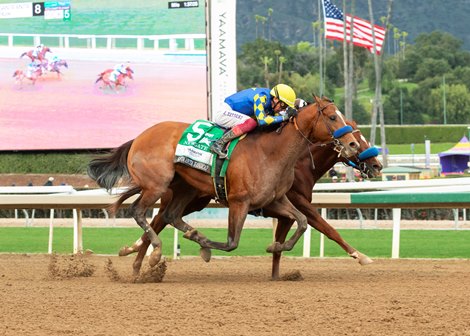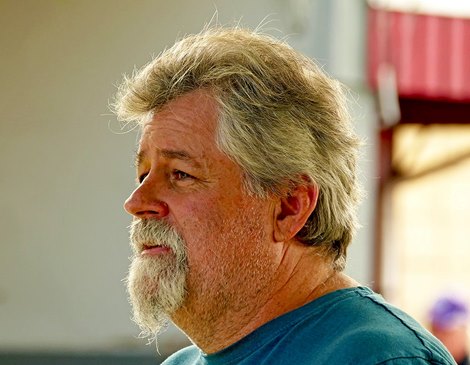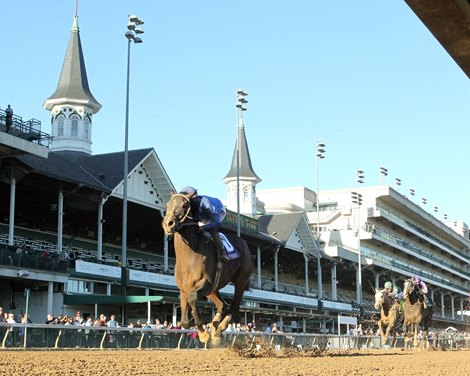In a panel loaded with critics of the Horseracing Integrity and Safety Authority Aug. 16, Brett Bonin didn’t mince words when asked about the effect of HISA on Thoroughbred racing in Louisiana.
“It’s an industry-killing unfunded mandate,” said the assistant attorney general for the Department of Justice in Louisiana, one of several states opposing HISA in court.
Bonin delivered this assessment as part of an Aug. 16 panel at the Racing and Gaming Conference in Saratoga, N.Y., called “HISA—Legal Limbo and Regulatory Reluctance.” With all three panelists having vested interests in the old state-to-state system of regulating racing’s anti-doping, medication control, and safety efforts, the discussion was heavy on criticism.
For instance, Bonin is an assistant attorney general for the Department of Justice in Louisiana, one of several states opposing HISA in court.
Moderated by attorney Pete Sacopulos of the firm Sacopulos, Johnson, and Sacopulos, the panel included HISA critics Bonin; Julie Brown, a commissioner on the Florida Gaming Control Commission; and Dan Hartman, former director of the Colorado Division of Gaming.
Sign up for BloodHorse Daily
Sacopulos presented an overview of the various constitutional issues that states have used in their lawsuits before asking the panelists about their experience with the HISA legislation and the Authority that began oversight of safety issues in 2022 and Anti-Doping and Medication Control in May.
Florida’s Gaming Control Commission is a recently established division that regulates all forms of gambling in the state. Brown expressed concern that HISA’s oversight will adulterate what she characterized as Florida’s vigorous enforcement of medication violations. (Florida is one of the states where former trainers Jorge Navarro and Jason Servis thrived until their careers were derailed by federal convictions for crimes related to doping.)
She noted that HISA’s hammer, the ability to conduct interstate wagering, got Florida on board.
“Interstate wagering is so important to our state that we knew we were opting in,” she said. “But we didn’t like it. We want to be able to hold (Florida oversight) to the standard that we’ve had for decades.”
Sacoulos said he receives calls weekly from “covered individuals,” HISA’s term for licensees, seeking legal advice.
“I have to tell them I’m not going to be able to help them,” he said, “because, very simply, HISA has priced due process out of the game. And if the opportunity to be heard is priced so high that no one can afford it, you don’t have due process.”
Hartman agreed, saying, “It’s probably going to run people out of business.”
Of the three panelists, Bonin was the most vociferous critic.
“We’re fighting for the life of horse racing in this country,” he said. “HISA will be absolutely devastating to horse racing in our state.”
He also suggested that state regulators are the heroes of the sport.
“They’re the soul of the industry, and HISA wants to wipe them out,” he said.
Impact of Robotic Wagering
The final panel saw moderator Patrick Brown, the conference’s organizer and the co-founder and partner emeritus of Brown Weinraub; talk with Patrick Cummings, executive director of the Thoroughbred Idea Foundation; Michele Fischer, vice president, SIS Content Services and the president of Darting Star; Marshall Gramm, professor and chair of the department of economics at Rhodes College and co-owner of Ten Strike Racing; and David O’Rourke, president and CEO of the New York Racing Association on the hot topic of “Racing’s Changing Customer Base, CRWs and the Future of Betting.”
Though nominally about the threat that computer-robotic wagering poses to retail and smaller bettors, the conversation evolved into a wider discussion of the factors that drive bettors away from racetracks and into other wagering markets. While Cummings, Gramm, and O’Rourke acknowledged the late odds changes caused by CRW, Fischer, who works with high-volume bettors, observed that short fields and heavy favorites also are driving away everyday players.
“The most important piece of information we have is the odds board,” said Gramm. “Odds move, and now they move more than they ever have. Bettors have no clue what prices they’re going to get.”
NYRA has put restrictions in place for CRW, including a requirement that they wager into the win pool at least two minutes before post. That restriction has resulted in CRW teams exiting the win pools at NYRA tracks.
“I admire efforts to make at least the win pool more stable, and there have to be more tools available to the public to give them information about what a price is going to be,” Gramm said. That information could come in the form of tracks such as Horseshoe Indianapolis partnering with Daily Racing Form to provide projected win odds based on wagering totals in the win pool as well as pools such as the daily double and pick 3s.










Leave feedback about this